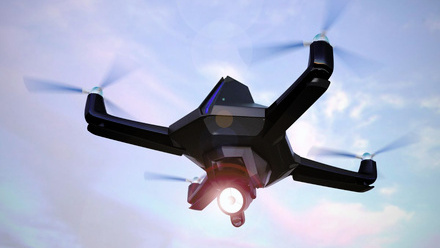Empowering Autonomous Defence through Secure Multi-Domain Interoperability
Guest blog by Ian Walter, Sales and Marketing Director at 4Secure #DefTechWeek
Autonomous systems such as drones, ground vehicles, naval assets, and satellites increasingly rely on secure, real-time data exchange to perform effectively. Seamless communication across classified and unclassified environments is critical to these systems’ ability to respond to dynamic threats and adapt on the battlefield. Instantaneous data sharing across domains is essential for enabling autonomous systems to act with speed, intelligence, and survivability.
The role of autonomous systems now extends beyond traditional domains—land, sea, air, and space—to include cyber and data networks. Integrating digital networks with autonomous capabilities enables better decision-making, faster responses, and a strategic edge in complex situations. This integration is key for mission success in future defence scenarios.
Secure Data Flow for Effective Communication
Modern defence operations demand that autonomous systems can communicate securely across classification boundaries. By enabling continuous and secure data flow, these systems can operate with minimal human oversight. Effective multi-domain interoperability requires robust infrastructure and controls so that autonomous units can function independently within a larger, interconnected defence network.
One major challenge is achieving this secure data flow through Cross-Domain Solutions (CDS). CDS technologies and processes allow secure information exchange between classified and unclassified systems, enabling data to pass safely between domains without risk of exposure or breach. By adopting CDS and a data-centric security approach, defence operations can safely share diverse information types—like video feeds and sensor data—across security classifications and platforms. This enhances situational awareness and enables coordinated action across different operational domains.
Protecting Data Across Inbound and Outbound Channels
Securing inbound and outbound data exchanges is crucial for maintaining the functionality and effectiveness of autonomous systems. Defence organisations must ensure that information entering or leaving these systems is tamper-free and secure from unauthorised access. This safeguards both the autonomous system and the broader defence network from compromised data, which could undermine mission success. By embedding security checks, validation processes, and rigorous data filtering into CDS, defence can verify the accuracy, reliability, and confidentiality of shared information.
Adaptive security solutions are increasingly important as autonomous systems integrate physical and digital domains. These solutions help systems resist sophisticated, evolving cyber threats by applying mechanisms such as data normalization and data validation. This approach fortifies autonomous systems against both external and internal threats, ensuring sensitive data remains actionable for real-time decisions.
Bridging Cyber and Physical Domains with “Beyond Zero Trust”
As cyber and physical domains converge, adaptive security frameworks become essential to protect the integrity and functionality of autonomous systems in interconnected environments. These frameworks allow defence organisations to safeguard data exchanges and secure the communication pathways for autonomous systems. Prioritising security at every level helps build resilient infrastructures that protect both data and the systems.
Zero Trust principles play a vital role in enabling autonomous systems to communicate securely with command structures. Traditional security models that rely on perimeter defences are replaced by Zero Trust, which operates under the assumption that no user, device, or system is inherently trustworthy. Every access request is verified with strict identity protocols, allowing only authorised personnel and systems to interact with sensitive information. This mitigates both external and insider threats, creating a robust defence ecosystem.
A “Beyond Zero-Trust” (BZT) approach is even more rigorous, applying verification protocols not just to users and devices but to every data packet, payload, and message. This enhances security by ensuring that all data exchanged within defence operations is trusted and validated.
Leveraging Data for Smarter Autonomous Systems
When data is secure and verified, autonomous systems become powerful assets in the field. These systems often rely on embedded machine learning (ML) and artificial intelligence (AI) models, which require high-quality, structured data to operate effectively. Reliable data flows allow autonomous systems to make informed decisions, identify threats, detect vulnerabilities, and even recommend strategic actions.
For example, an autonomous vehicle with access to real-time intelligence can assess the nature and location of a threat, adapt its strategy, and communicate this data instantly to other assets. This capability reduces decision-making latency and enhances operational readiness. Data verification remains essential, ensuring that information is accurate and actionable, thus transforming autonomous systems into effective force multipliers in defence.
Conclusion: Securing Mission Success Through Integrated Data
In today’s digital landscape, where cyber threats can have consequences as severe as physical attacks, secure data-driven interoperability is paramount. Autonomous systems are becoming foundational to strategic defence, and their success hinges on seamless, secure data flow. By prioritising multi-domain interoperability and adopting advanced security frameworks like Cross-Domain Solutions and Beyond Zero Trust, defence operations can fully leverage the capabilities of autonomous technologies.
This integrated approach enables autonomous systems to operate intelligently and independently, equipped with the data needed for rapid, effective decision-making. By embracing this data-driven model, defence organisations will be better prepared for the challenges of modern warfare. With secure, real-time data exchange at the core of defence, autonomous systems can be trusted to perform their roles reliably, strategically, and with agility, reinforcing operational superiority and supporting mission success.
Defence Programme activities
The Defence programme works to help the UK’s defence technology sector align itself with the MOD. techUK members are able to navigate and better understand the UK Defence sector to successfully align their own investment and resources to take advantage of business opportunities. Visit the programme page here.
Upcoming events
Latest news and insights
Learn more and get involved
Defence updates
Sign-up to get the latest updates and opportunities from our Defence programme.
Meet the team

Fred Sugden
Associate Director, Defence and National Security, techUK
Fred is responsible for techUK's activities across the Defence and National Security sectors, working to provide members with access to key stakeholders across the Defence and National Security community. Before taking on the role of Associate Director for Defence and National Security, Fred joined techUK in 2018, working as the Programme Head for Defence at techUK, leading the organisation's engagement with the Ministry of Defence. Before joining techUK, he worked at ADS, the national trade association representing Aerospace, Defence, Security & Space companies in the UK.
Fred is responsible for techUK’s market engagement and policy development activities across the Defence and National Security sectors, working closely with various organisations within the Ministry of Defence, and across the wider National Security and Intelligence community. Fred works closely with many techUK member companies that have an interest in these sectors, and is responsible for the activities of techUK's senior Defence & Security Board. Working closely with techUK's Programme Head for Cyber Security, Fred oversees a broad range of activities for techUK members.
Outside of work, Fred's interests include football (a Watford FC fan) and skiing.
- Email:
- [email protected]
- Phone:
- 07985 234 170
Read lessmore

Jeremy Wimble
Senior Programme Manager, Defence, techUK
Jeremy manages techUK's defence programme, helping the UK's defence technology sector align itself with the Ministry of Defence - including the National Armaments Directorate (NAD), UK Defence Innovation (UKDI) and Frontline Commands - through a broad range of activities including policy consultation, private briefings and early market engagement. The Programme supports the MOD as it procures new digital technologies.
Prior to joining techUK, from 2016-2024 Jeremy was International Security Programme Manager at the Royal United Services Institute (RUSI) coordinating research and impact activities for funders including the FCDO and US Department of Defense, as well as business development and strategy.
Jeremy has a MA in International Relations from the University of Birmingham and a BA (Hons) in Politics & Social Policy from Swansea University.
- Email:
- [email protected]
- LinkedIn:
- https://www.linkedin.com/in/jeremy-wimble-89183482/
Read lessmore
Authors
Ian Walter
Sales and Marketing Director, 4Secure











